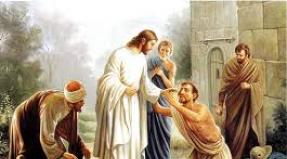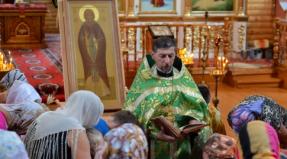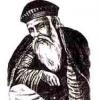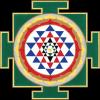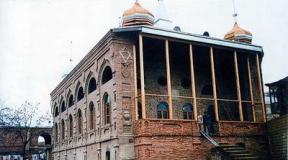When is the parent's day of the year. Parental Saturdays - what are they? What is the Selene funeral service
The days of commemoration of the dead in the Orthodox church tradition are also called "parental Saturday", although not all of them fall on Saturdays. On these days, the churches are commemorating dead Orthodox Christians. After the service, traditionally, it is customary to visit the cemetery.
Why these days the name "parental" appeared, historians tried to establish. Most likely, of course, this is from the word "parents". But this is how the ancient Christians called those who had already passed to the fathers. The second version says that there are days like this because it has always been customary for Orthodox Christians to pray for deceased parents on Saturdays.
Interesting! There are seven parental Saturdays in total in the year, as well as several other days of remembrance. Each has its own set date. Every year believers check the calendar because the dates of many parental Saturdays are rolling. For example, those that fall on the period of Great Lent directly depend on the dates of fasting that year.

Memorial Day 2016: Calendar
March 5 is celebrated on meat Saturday. It is also called the Universal Parental Saturday. This is the Saturday of the last week before Lent, when you can still eat meat. Then comes Pancake Week or Cheese Week (you can't eat meat, but you can eat dairy products and fish). ends on Sunday (March 13 in 2016), and then Lent begins.
Saturday of the second week is celebrated on March 26. Interestingly, during the period of fasting, services for the dead are not held. But on three established Saturdays, it is allowed to break this rule, to pray for the dead, to visit the cemetery.
April 2 will be the parental Saturday of the third week of Great Lent.
April 9 is the parental Saturday of the fourth week of Great Lent.
May 10 will be a big holiday Radonitsa. On this day, believers go to the graves of their ancestors to tell them that Christ is Risen. This day always falls on the second Tuesday after Easter. Many go to the cemetery on Easter itself, but, according to church traditions, this is wrong. To visit the graves in honor of the great holiday, there is a special day for this - Radonitsa. In Belarus, this day is an official day off.
May 9 is the Day of Remembrance of the departed soldiers.
Trinity Saturday takes place on June 18th.
November 5 will be Dmitrievskaya Saturday.
What is the Ecumenical Saturday and the memorial service
There are seven parental Saturdays in the year, but especially the Orthodox Church allocates Ecumenical Saturdays. On this day, the church commemorates with prayers all the departed baptized Christians. Ecumenical is Meat Saturday, which takes place a week before the beginning of Lent, as well as Trinity Saturday, which is celebrated on the eve of the great holiday of Pentecost. On these days, ecumenical memorial services are performed in churches.

An ecumenical or parental funeral service in churches takes place in each established church calendar Parents day. The word "requiem" is called the funeral service. On it they pray for dead people and ask the Lord to give them mercy, to forgive their sins. Translated from greek Panikhida means all-night vigil.
Parental Saturdays of Lent and Radonitsa
So, the days of commemoration of the dead in 2016 will be held on March 5, 26, April 2 and 9, May 9. And also after the end of the fast there will be Radonitsa, which this year falls on May 10. According to the church charter, during the period of fasting, memorial services are not performed. But, three days are specially allocated when you can remember the dead with prayer. These are always Saturdays in the second, third and fourth weeks of fasting.
The Radonitsa holiday is also called Radunitsa. This is a day of special remembrance of the dead. It is associated with Easter and is considered a holiday. The holiday always falls on the Tuesday of St. Thomas' week after Easter (this is the second holiday week). On this day, you should go to the cemetery with painted eggs and cakes to tell the dead that Jesus Christ announced the victory of life over death with his resurrection.
Orthodox Christians, in their prayers, commemorate dead loved ones, relatives, give alms for them, do good deeds, light candles in the church, etc. This is how we remember our dead, which greatly help them in their eternal life, and bring relief. In addition to ordinary days, there are special parental Saturdays for this - what days in 2016, and how to remember, we will tell you in more detail.
They are waiting for our help there!
I remember reading somewhere for a long time a story about how a Komsomol girl still in soviet times, buried her father, a year later - her mother, and she was left alone, she had no one. She lived in a communal apartment with two not young women who took care of her in their own way. And somehow they noticed that for several days the girl comes, closes herself in her room, comes out crying, worried, but does not tell them anything. They were already worried about her condition, everyone was thinking, wondering what was wrong with the girl, when suddenly she comes cheerful, happy and tells what happened.
Here she had a dream several times that she sees her parents in heaven, such a large beautiful garden, there is a large table lined with all kinds of food, everyone is sitting, eating, drinking, and her parents are hunched over to the side, and no one is at the table. does not invite. She asks: Mommy, Daddy, why aren't you at the table? And they are sad to her like this: - And there is no our share ...
The girl, waking up, cried, worried, then, she says, spat on the Komsomol, atheism and rushed to the priest. He asked her: and when her parents died - they confessed, received communion, they were buried, prayers were read for them?
The girl nodded her head sadly and negatively to all the questions. As a result of the conversation with the priest, she lit candles for her parents, ordered a magpie, distributed what she could, alms for them, and what other good deeds she did at the instigation of the priest. And, about happiness, after some time she had a dream that her parents, happy and contented, were sitting with everyone and said to her: "Thank you, my daughter, now everything is fine with us here!"
This is how parental Saturdays are in order to remember the dead with the whole church and to make their eternal life easier for them, because they themselves cannot do anything. Only here, during earthly life, can we take care of ourselves, of our eternity, and then - only through the prayers of our loved ones can we receive help.
What is parental Saturday and how many are there in total?

The church has allocated 7 days a year for parental Saturdays, on which it is accepted diligently, as they say, by the whole Orthodox world to pray and to commemorate their dead. Prayers and memorial services are served in churches in a special way on these days, people come to light candles for their loved ones, submit notes, bring food to the temple, thus distributing alms, and remembering their dead relatives. Parental Saturdays were called because people first of all commemorated their parents, and then with them all the rest of the deceased.
Of the 7 parental Sabbaths - 2 Ecumenical, on which all baptized Christians born from the age are remembered - these are Meat and Trinity. The first is a week before Easter, the second is on the eve of Trinity.
There are 5 more private parents - three of them - during the Great Lent in the 2nd, 3rd and 5th weeks, then another Radonitsa, on May 9, the dead defenders of the Motherland and Dimitrievskaya Saturday are commemorated.
Parental Saturdays in 2016
- March 5, 2016 - Ecumenical Meat Parent Saturday;
- March 26 private parental;
- April 2 - private;
- April 9 - private;
- May 9 - commemoration of the dead soldiers;
- May 10, 2016 - Radonitsa;
- June 18, 2016 - Trinity Ecumenical;
- November 5, 2016 - Dmitrievskaya memorial.
During Great Lent, memorials for the dead are not accepted, as on ordinary days, for them 3 Saturdays are allocated for the second, third, and fourth weeks.
One of them is Radonitsa, the most beloved among Christians. On this Saturday, people have been going to the cemetery for a long time, and bring good news to their dead (from the word joy - Radonitsa) that Christ has risen and gave everyone eternal life... This is the second week after Easter.
Demetrius Saturday is also highly revered by the people, this is the last parental Saturday of the year, the final one, so to speak.
What to do on parental Saturday

On Friday evening in the churches the "parastas" is served, that is, the great requiem, on Saturday morning there is also a requiem at the end of the Divine Liturgy.
What do we have to do - come to the evening on Friday, in the morning - to the Liturgy, take part in the funeral service, you can bring lean products to the temple, and only then go to the cemetery, take care of the grave, pay attention to the burial place of loved ones. But not instead of a temple - immediately to the grave. Services and candles in church will help your dead more than just visiting the cemetery, and even worse - arranging drunkenness on the graves, than you will further harm your loved ones who have died, instead of helping them.
When you pray for the dead at home, in the temple, when you put candles on the eve, read the following prayer:
"Rest, O Lord, the soul of your deceased servant (s) (name), and forgive him all his sins, voluntary and involuntary, and grant him the kingdom of heaven"
And remember: The Lord asks from us only one thing - love. Love for the Lord, and hence the love for neighbors that follows. Then there will be no thoughts of condemnation, no pride, no resentment, no insults. If you love a person - do you believe him, are affectionate with him, always want to be near and help? Here, everything follows from here. And good deeds - the Lord always rejoices when our heart is not callous and merciful, and no matter what we do good for any of the people, we do for Him.
God bless everyone!
R. B. Olga
Discussion: 8 comments
Under Soviet rule, when we were Komsomol members, party members, it was impossible, of course - everyone had to be atheists, you could fly out of the party for such things! we remember that they secretly baptized my daughter at home, called the priest from another city, because all the Communist Komsomol members were ... Those were the times ...
To answer
I was also secretly baptized at one time, they traveled to another city so that they would not inform my parents about work. But parental Saturday, as far as I can remember, has always been revered, even when the Soviet regime was.
To answer
yes, perhaps this is really all very important, thanks for so much detailed story about parental Saturdays, and many now do not know at all what they are, why and how to properly spend them.
To answer
How was the girl not scared then ??? And here is a counter question. And that under the Komsomol it was impossible to believe or what? Why weren't the parents buried?
To answer
Orthodox Christians commemorate those who have passed to another world 7 times throughout the year. These days are called memorial or parental Saturdays. You can remember those who have not been with you for a long time, and on any other days. However, it is these seven days that are considered a special time when you can help your soulmates to be cleansed by praying for them sincerely and with love. Orthodox parental Saturdays in 2016 fall mainly in February-March, and only one of them is celebrated in November.
Parental days are called because all the deceased are considered to have gone to their parents, ancestors. Therefore, they commemorate all those who have passed away, but first of all - the closest ones.
Separately, there are two "ecumenical" Saturdays, when all Christians who have left this world are remembered, and memorial services are held in Orthodox churches. Most of the dates for parental Saturdays vary from year to year and are associated with major holidays, as will be discussed below. Three Saturdays fall in the spring period, more precisely - on the Easter fast. On these memorial days, it is imperative to pray for those who are not alive in order to alleviate their sins and pray to God to be merciful to their souls.
Parent Saturday Calendar 2016
May 10 - Radonitsa. 9th day after Easter. It falls on Tuesday, not Saturday, but in its meaning it refers to the general cycle of memorial days.
On each of the parental Saturdays, funeral services are performed in the church, i.e. services for repose, where parishioners pray for souls to repose, and the Lord was merciful to them, forgiving sins. For this, special prayer texts are read. On Meat Saturday, they especially try to remember those who left this world unexpectedly and were left without proper burial according to Christian traditions.
Trinity and parental Saturday
One of the memorial days falls on Saturday the day before orthodox Trinity... As you can see, most parental Saturdays are associated with large christian holidays... This memorial service differs from others in that you can even pray for sinners - criminals, suicides, etc. The Feast of the Trinity symbolizes the descent of the Holy Spirit to earth in order to save all souls without exception. It is believed that the congregational prayer on this day for the departed has excessive power. During the service, they read the 17th kathisma, ask for peace for souls and merciful forgiveness for deceased relatives in prayers.
Radonitsa and parental Saturday
Radonitsa is the name for the day that falls on Tuesday (after Fomin's week). People remember on this holiday about the descent of Christ into hell, the Resurrection and his victory over death. Radonitsa is associated directly with the triumph of life over death. It is customary to visit cemeteries; the resurrection of Christ is glorified at the graves.
Dimitrievskaya memorial Saturday is named in honor of the martyr Demetrius of Thessaloniki and falls on the Saturday preceding November 8. Initially, on Dimitrievskaya Saturday, only those who died in the Battle of Kulikovo were commemorated, but over the years, the tradition changed and all those who died were commemorated.
On the eve of the memorial Saturday, on Friday evening in churches there are great memorial services, also called "parastas". On Saturday mornings, funeral liturgies take place, followed by general requiems. For the funeral, you can submit notes with the names of deceased relatives or other close people, about their repose. It is also customary to bring food to the temples "on the canon" (eve). it lean food, and from wines Cahors is allowed.
What can and cannot be done on Orthodox parental Saturday
On any parent Saturday 2016, it is recommended to go to orthodox church, to pray sincerely for the granting of peace to the souls of the departed, as they say, for God everyone is alive! Also good in agreement with ancient tradition bring food to the temple for remembrance. Earlier, parishioners made a table at which they gathered together and commemorated everyone - both their own and others. Now they just bring food, and the ministers distribute food for remembrance to people in need. Also, the church advises to submit notes in which the names of deceased loved ones are indicated for church mention in prayers.
Even if you did not manage to visit the church on Orthodox memorial Saturday, pray at home with an open heart. This will cleanse your heart of filth and ease the lot of the departed, because they are no longer able to stand up for themselves, but you can help them find peace and grace. If you do not know what to read, open 17 kathisma (or 118 psalm), a prayer for the dead for relatives, loved ones, all Orthodox.
It is believed that on parental Saturdays one should not do the cleaning, do the laundry, and wash in the gardens. In most cases, these are superstitions that are not confirmed by the church: if business does not prevent you from visiting the temple and praying, then you can do them. For example, a warning about washing these days went with long ago... When to carry out a simple procedure, as it seems to us now, we had to bother all day: chop wood, heat the bath, apply water, so it turned out that there was no time left for prayer and visiting the temple.
You can visit the graves, clean them up. First of all, the responsibility for the state of the tombstones lies with the children, whose parents have passed away. They just have to make sure that parenting days did not pass unnoticed in the maelstrom of daily chores. When memorial days fall on the period of fasting, then one should not commemorate with meager foods, breaking the fast. Make do with the foods that are allowed on these days.
You cannot grieve beyond measure these days: remembering does not mean grieving. Indeed, according to Christian beliefs, the soul is immortal, which means that it simply passed into a world unknown to us. If a person led a righteous life, then his soul arrives in an eternal state of love, harmony, joy, the so-called paradise. If a person, on the contrary, committed sinful acts, his soul languishes in a worse world and experiences endless torment.
A person can influence this fate exclusively during life; after death, only a prayer read with extraordinary faith and love can save him from torment. Who, if not close people, can perform this prayer? That is why it is necessary to devote each parental Saturday to prayer words spoken with a pure heart. Many people are mistaken, interpreting the remembrance as the need to drink a glass of intoxicants at the cemetery - with such an act you will not alleviate the fate of the departed.
Remembrance of the departed loved ones and deceased relatives - trembling orthodox tradition, for which special days are allocated by the church calendar. The most important in its significance is Parents' Day after Easter. What date is Parent's Day in 2016? Each time it comes nine days after the Resurrection of Christ. This year Parents' Day is celebrated on May 10th.
What date is Parent's Day in 2016: how to celebrate this date?

Why is it customary to go to the cemetery on Parent's Day?

Visiting cemeteries on Parent's Day is not so much related to a tribute to the memory of our relatives, who died or died in different years... Their memory is always alive as long as they are remembered. A visit to the cemetery on Radonitsa and other Parental days is a great reason to clean up on your grave loved one garbage, leaves, plant flowers, plants and trees there. Caring for the grave in the cemetery, believers mentally communicate with the deceased person, pray for the peace of his soul, remember the bright days spent with him, ask for forgiveness for his soul for all the insults you have ever inflicted on him during his lifetime. Visiting cemeteries on Parent's Day maintains respect and love in believers for those who have passed away, strengthens faith, strengthens the desire to live and do something good in life. You need only good memories of the dead, so drinking alcohol in cemeteries is not approved by the church and true believers. Best timespent at the cemetery is a prayer during which you clean up everything on the grave of a loved one, decorate it, correct the monument and mentally communicate with God.

What is the date of the Trinity in 2016, find out
Parental days are memorial days for deceased ancestors. In the calendar of the Orthodox Church, every day is dedicated to a certain event. According to the Orthodox church tradition, it is customary to remember your deceased relatives on certain days of the year. These days are called parenting days or parental Saturdays, although these dates do not always fall on Saturday.
The most important parenting days among the people are considered Radonitsa, Trinity Saturday and Dimitrovskaya, but there are also Ecumenical memorial days. In addition, it is necessary to honor the memory of departed relatives on their birthday and on the day of death. Many commemorate the deceased on the day of his angel (the saint in whose honor he was baptized).
As for parental Saturdays in 2016, they are scheduled for certain days, when general liturgies (funeral services) are read in churches, and every believer can join this prayer, remembering their relatives. During the year there are 9 such special memorial days, of which 6 times always fall on Saturdays, they are called that " ". Once we honor the memory of the deceased on Tuesday on Radonitsa, and on May 9 and September 11 are set aside for the commemoration of the deceased soldiers and can fall on any days of the week.
Those who have Christian names are remembered for health, and only those who are baptized in the Orthodox Church about repose. At the liturgy, you can submit notes:
On proskomedia - the first part of the liturgy, when for each name indicated in the note, particles are removed from special prosphora, which are subsequently lowered into the Blood of Christ with a prayer for the forgiveness of sins
First, March 5, will come ecumenical meaty Saturday... Then, on March 26, comes second Saturday of Great Lent... The next parental day falls on April 2. The Saturday of the fourth week of Great Lent will come a week later, on April 9.
May 9 will come day of remembrance for all those killed during the Second World War... June 16, on the seventh Thursday after Easter, there will be a day of remembrance of suicides, unbaptized and killed a violent death ... In 2 days, June 18 will be Trinity parental Saturday... 11 September - day of remembrance for soldiers who died in the war... November 5 - Dmitrievskaya parental Saturday.
Ecumenical parenting Saturdays
Ecumenical parental Saturdays, or Ecumenical funerals, according to the liturgical charter of the Orthodox Church, are celebrated twice a year:
Meat Saturday - there will be a memorial day on March 5,
which is called the Ecumenical meat-eating Saturday
This is the oldest and most solemn memorial day. Its history dates back to the early centuries of Christianity and should remind believers, first of all, of the Day of Judgment. According to church tradition, the first Christians gathered in cemeteries and prayed for their fellow believers, especially for those who died suddenly and therefore did not receive a worthy burial.
The meaning of the rite is to prepare as much as possible for a new one, afterlife and meeting with God the souls of all believers, not forgetting about the souls who left the earthly world. On Meat Saturday, the deceased are remembered from Adam to our time. In popular beliefs, the motive of preparation for the upcoming renewal is also traced - only here we mean the renewal of nature and the transition to spring; It is no coincidence that Saturday is preceded by a cheerful Shrovetide.
In Belarus and the western regions of Russia, Meat Parent Saturday is a kind of meeting of all members of the family, both current and former. When the table is laid, you can see the number of appliances in excess of the number of those present: in this way, deceased relatives are treated. On this holiday, alms are given for the salvation of all Christian souls.
The indefatigable Psalter is read not only about health, but also about repose. Since ancient times, ordering a commemoration at the Unsleeping Psalter is considered a great charity for a deceased soul. It is also good to order the Unsleeping Psalter for yourself, support will be vividly felt.
And one more important point, but far from the least important. There is eternal remembrance on the Unsleeping Psalter. It seems expensive, but the result is more than a million times the money spent. If this is not possible, then you can order for a shorter period. And it's good to read it yourself.
Trinity Saturday - a memorial day falls on June 18,
which is called Trinity Saturday
An equally significant day for the special commemoration of the dead in Orthodoxy is Trinity Saturday. According to legend, on the fiftieth day after the Resurrection of Christ, the Holy Spirit descended on the apostles and they received the gift of teaching people the Word of God.
The day symbolizes the complete cleansing of the soul by the Holy Spirit, the transition to the highest level of perfection and initiation into universal human knowledge. On Trinity Saturday, absolutely all the dead are commemorated, including those who are in hell.
It is considered a bad sign if it is not possible to visit the graves of relatives on Trinity: then they will come to the house and begin to disturb the living. To appease the dead, sweets or the remains of a memorial dinner are left in the cemetery. There are many folk legends associated with Trinity Saturday.
Girls are not allowed to do any housework. A Trinity wedding is an extremely ominous sign; the people believe that the marriage will be unhappy. Beliefs advise not to swim, because mermaids frolic at Trinity and can carry away a living person to their kingdom.
Parental Saturdays during Great Lent
Parental Saturdays, 2nd, 3rd and 4th Saturdays of Great Lent
On the March 26 will be a memorial day - this will be the second universal Saturday of Great Lent.
On the April 2 will be a memorial day - this will be the third universal Saturday of Great Lent.
On the April 9 will be a memorial day - this will be the fourth parental Saturday of Great Lent.
The meaning of Lenten memorial days is a manifestation of care and love for the souls of deceased neighbors. During the most important orthodox fasting divine liturgies are not carried out - it turns out that souls remain forgotten. Due respect is given if believers go to church and read prayers for people dear to their hearts, so that the Lord does not leave them without His mercy. It is advisable to read a prayer for the departed and at home.
It must be remembered that such a prayer brings God's grace to the Christian himself. In the whirlwind of everyday routine and everyday little things, the kindest feelings seem to be overwritten; we begin to treat those whom we truly love with condescension, and sometimes with disdain. It is a pity that the realization of the importance of every word or moment comes too late, and then many people forget the deceased.
Regardless of whether a person considers himself a Christian or not, he must accustom himself to grateful respect and memory - this is part of his upbringing and moral culture. Therefore, parental Saturdays are, first of all, days of deep respect for each other.

Private parenting days
Radonitsa, the ninth day after Easter, is a significant day for eastern Slavs, in which Christianity and the most ancient folk customs... The word "Radonitsa" is cognate with the word "rejoice". According to the church interpretation, the celebration reflected the idea of \u200b\u200bthe complete victory of Jesus Christ over death; it was on the ninth day after his Resurrection that the Savior descended to the dead and announced to them the good news of his Resurrection.
Commemoration of the dead at this time bears the imprint of solemnity: when visiting cemeteries, one should not indulge in noisy festivities, and the deceased must be remembered in silence. Often Easter eggs are buried in the graves and in this way they christen with loved ones.
In the Chernihiv region, it is customary to leave crumbs in the hope that ancestors will appear, feast on and bring news. There is a sign on Radonitsa: whoever hails the rain first will become luckier. From Radonitsa, funeral services begin in Orthodox churches.
Memorial Day for Orthodox Warriors, for Faith, Tsar and Fatherland
The commemoration of Orthodox warriors on this day was established in the Russian orthodox Church by the decree of Empress Catherine II in 1769 during the Russo-Turkish War (1768-1774). On this day, the Beheading of John the Baptist, who suffered for the truth, is remembered.
Compared to other memorial days and parental Saturdays, this day seems the most poignant and tragic. The celebration is associated with the biblical legend of Herod. During the celebration, King Herod, delighted with the dance of his stepdaughter Salome, vowed to publicly give her whatever she wanted.
At the instigation of her mother, the insidious Herodias, Salome asked for the head of the prophet John the Baptist on a golden dish. The king, fearing universal condemnation, complied with the request. Since then, the holiday has become the embodiment of courage and perseverance in the struggle for faith and a just cause.
In 1769, when Russia was waging wars with Poland and Turkey, the church introduced it into the Charter as the Day of Remembrance of the soldiers who fell in battle, so that the feat of compatriots would remain for centuries. It is necessary to fast strictly on a holiday; even fish is prohibited. It is believed that if you do not eat anything but bread, you can make a wish at night.
There is a superstition that on September 11, you cannot pick up sharp objects, as well as anything that in one way or another resembles a head. However, superstition is contrary to the commandments of the official church.
This type of commemoration of the dead can be ordered at any hour - there are no restrictions in this either. During Great Lent, when the full liturgy is much less often performed, in a number of churches this is the practice of commemoration - in the altar during the entire fast they read all the names in the notes and, if they serve the Liturgy, then take out the particles. You just need to remember that those baptized in Orthodox faith people, as in the notes submitted to the proskomedia, are allowed to enter the names of only the baptized deceased.
Dmitrievskaya Saturday is another day associated with special commemoration dead warriors. The appearance of the celebration refers to the victory over the Mamai horde in the Battle of Kulikovo. According to legend, Dmitry Donskoy asked for blessing for the battle from Sergius of Radonezh himself. The Tatar-Mongol yoke was defeated, the native land was saved from desecration, but this was done at a very bloody cost: about 100,000 soldiers died. The army also included two monks: Peresvet and Oslyabya.
Starting from the 19th century, in all military units, the holiday was strictly observed: a special memorial service was served on Dmitrievskaya Saturday. They prepare for Dmitrievskaya Saturday in advance: a day before the celebration, it is customary to go to the bathhouse and wash, and after leaving, leave a towel for the ancestors.
It is customary not only to visit the graves, as on all other Saturdays, but also to celebrate a magnificent funeral there. The whole family gathers at the table on holiday. Folk wisdom states: the more magnificent the table, the more satisfied the forefathers will remain, and the more satisfied the forefathers, the better and more calm the survivors. One of the dishes must be pork. It is important to remember only good things about the dead and to have someone from the youngest generation present during the conversation. There is a sign that if it is snowing and cold on Dmitrievskaya Saturday, then spring will also be cold.
Church requirements in Jerusalem
